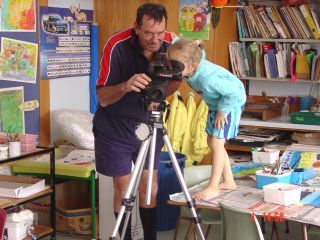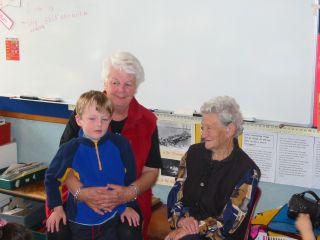 |
 |
|
|
Bayswater Primary School
The Devonport Peninsula
Year 1 & 2 Children's Questions about Devonport's History

Cheyanne's Grandfather, Mr Halpin answered some questions asked by Year 1 & 2
What school did you go to? – Cheyanne
St Leo's, the small school opposite the churches and Takapuna Grammar.
What rules did you have at school? – Kayla
It was very strict. There was corporal punishment, such as caning, which included six of the best where you bent over and got whacked on the behind with a big cane, man it used to hurt, the strap was whacked onto the hand, and it hurt too.
What did you do in maths and reading? – Eden
1 to 14 times tables, division and reading long books by Jules Verne.
What did you eat when you were a child? – Jack
Natural foods, killed at home or grown at home e.g. free range eggs. My mother made her own bread.
What kinds of playgrounds did you play on in Devonport? – Kayla
We played most days on Mt Victoria, before and after school. We made our own play such as flying foxes, boats from tin, trolleys to race down from King's store towards Belmont.
Has Devonport changed since you were a child? – Miles
We had the space to do anything. Now houses are everywhere and no space is left for you to grow.
Cheyanne's mother helped too
Were you born in Devonport? – Israel
Yes, I was born at the Devonport Obstetrics Hospital. It has now closed but it was in Buchanan St.
What kind of houses have you lived in? – Cheyanne
I am still living in the family home I was brought up in. There have been five generations through the house now.
What did your school look like? – Isabella
Bayswater School looked very similar to today. We had prefabs where the hall is now. There was a giant slide and maypole to play on. We also had tunnels and a log cabin to play in.
Has Devonport changed since you were a child? – Miles
Yes, some of the old houses have gone. The big old theatre on Victoria road has been demolished and replaced with apartments. The little old Police station in Ratray St has gone too. We used to get on the wooden Kestrel ferry with gang planks. The wharf building was corrugated iron.
Room 9 interviewed Mrs MacDuff about "How Devonport has changed since she was a child"
Israel said when Mrs MacDuff was a child there was no harbour bridge for cars so the cars had to go on a vehicular ferry.
Miles said that during Mrs MacDuff's childhood people had to do a lot of handwork like knitting.
Campbell said that Mrs MacDuff used an outside toilet but now we have inside toilets.
Holly said Mrs MacDuff used soft apple paper to wipe herself. They used little glass bottles for milk.
Eden said Mrs MacDuff did her washing with a big stick in hot water.
Isabella said all children walked to school but now we walk as a walking school bus.
Miles said Mrs MacDuff liked the ice-cream with the three layers on top. It was called a Rangitoto ice cream.
Max said there were more trees than houses in the olden days.
Kayla said Mrs MacDuff had a special cupboard to put ice into to act like a refrigerator. An ice man and a milk man delivered ice and milk to the house.
Liam said Devonport had one fire engine when Mrs MacDuff was a child. We have two now.
 |
Max's great great aunty, Mrs Seagar, helped as well |
Some interesting things Mrs Seagar told the class and later recalled were:
- She used big blocks of ice for a fridge. "The ice man delivered it to her house," said Campbell.
- She played with skipping ropes and climbed trees and she had two dogs. "There were no game boys or tramp or play stations or x boxes or televisions," said Miles
- She also had other home made toys like swings, trolleys, scooters, kites and spinning tops. "They played games of naughts and crosses, snakes and ladders, jigsaws, French knitting and hop scotch. On Sunday nights they would stand around the piano and sing and read poetry," added Hazel and Cheyanne
- "The grocery man delivered the food on a horse and carriage because there was no supermarket," said Isabella.
- "The grocer always brought some lollies," said Cheyanne.
- "When it was her birthday she would play outside," said Cheyanne
- "For Christmas she would get a few nuts, two cherries and an orange. Sometimes she got a special treat like a doll," said Kayla.
Some of the children?s questions were:-
"Why did you have to clean the house?" Asked Kayla. "There were five children in my family and everyone had duties. There were no dishwashers then," replied Mrs Segar.
"Did you have a garage?" Asked Eden "No because we did not have a car," replied Mrs Seagar.
"Did you have ice creams and ice blocks?" Asked Eden "Yes we had ice creams but we did not have ice blocks."
"Did you buy much from the shops?" Asked Isabella "No Mum made everything, including the jam; my parents grew our vegetables," replied Mrs Seagar.
Some other interesting things Mrs Seagar told us were:
- Her grandparents came from England in a sailing ship.
- There were stables for the delivery horses where the New World Supermarket is now.
- It wasn't until 1926 that the roads got sealed, they were dust roads until then.
- They used to cook on a coal range which she and her sister had to black nugget after school each night.
- There was no primary school at Bayswater.
- There was a swimming pool at the Bayswater Yacht Club.
- Trams ran from the Bayswater ferry to Lake Pupuke.
- There were cow paddocks along Bayswater Avenue.The ice came wrapped in newspaper and a sack twice a week.
- We used to wear dresses as our school uniform. Takapuna Grammar School had white blouses, gym frocks and black stockings as well as gloves.